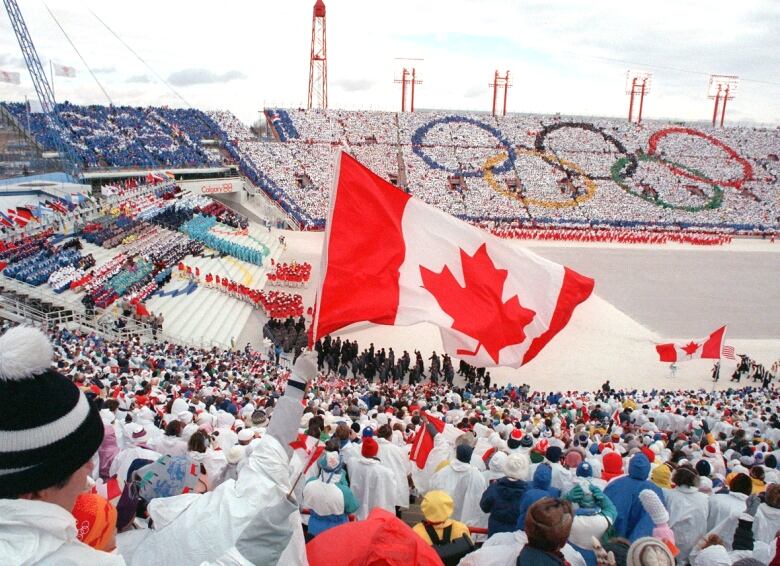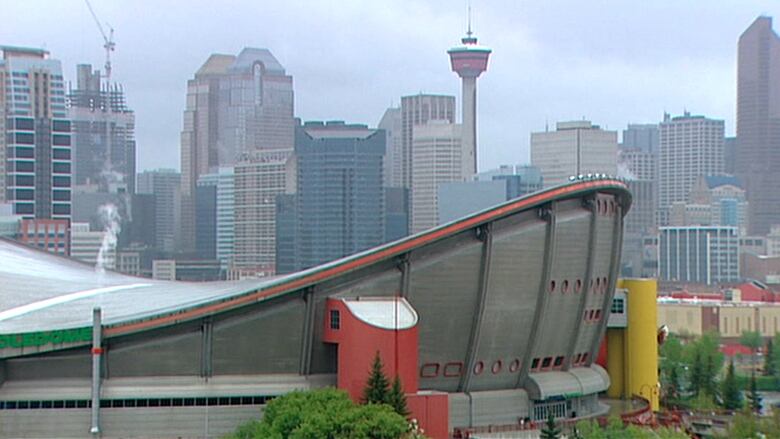Olympics helped create Calgary in surprising ways
Olympics generated that sense of 'pulling together'

This story was originally published June 22.
So Calgary is talking about hosting another Olympics in Calgary. Those games helped create our city back in the day. They were a symbol of something new, and a practical way of reshaping the landscape. University of Calgary sociology professor Harry Hiller has been studying the effects of the Games on our city and others for decades.

Q:It is not uncommon to hear the Olympics "put Calgary on the map." To what degree did our city's national and international presence change during and after the Olympics?
One of the terms that is often used about the Olympics is that it is a "signalling event" for a host city.
For example, the Beijing 2008 Olympics was meant to "signal" to the rest of the world about a new and more modern China taking its place on the world stage.The same could be said for Rio de Janeiro 2016.Similarlythe 2006 Torino Olympics served as an important symbol of a transformation of a city that was once the center of automobile manufacturing (the home of Fiat) and was now shifting to a post-industrial future of high technology.
- City council moves forward with study of 2026 Winter Olympic bid
- Olympics could be gold medal fix for Calgary's economy, says head of bid committee
There is no doubt that, whether it was planned that way or not, the Calgary Olympics truly represented the emergence of a new kind of city.
The energy crisis of the 1970s, created by OPEC,which led to a significant increase in oil prices served as a catalyst to a boom which impacted the city from the mid-70's to the early 80's only cut short by the National EnergyProgram.But it was during these heady days that Calgary launched its bid for the Games obviously fuelled by the city's newfound sense of power and importance.

It could be said that Calgary's transformation by oil into a city of more global importance, supported the city's claim to be ready to host a sport event of global importance.
In that sense, hosting the Olympics reflected a general feeling in the city that to be recognized globally by winning the bid was an important achievement for a city breaking out of its former status as only a prairie city on the margins of power and influence in Canada.
The Games were then an important symbol for the residents of the city in terms of its changing place within Canada as well as its place in the world.
Unfortunately, while at the time the Games elevated Calgary's profile internationally, memories fade over time and new generations are less likely to know of that Olympic heritage elsewhere.
But there is no doubt that the 1988 Olympics servedas an important marker in the city's history.
Q: Do you think the Olympics in Calgary were successful? What impact did the Games have on city residents?
There are many ways to measure the success of the Games.
Even though considerable public money was used to make the Games happen, most local residents were convinced that the use of these funds was legitimate and debt did not become an irritable legacy like it became in Montreal.
It did not hurt that IOC President Juan Antonio Samaranch declared the Calgary Games "the best ever" (a phrase he used for other host cities as well) in spite of the fact that no Canadians won gold medals at these Games.
What really made the difference in Calgary was the way in which citizens became involved in the Games.
In many ways, Calgary made significant advances in how residents were used as volunteers in support of the Games which became a model for later Games.

Furthermore, citizen participation in festival-like activities surrounding the Games such as in the downtown core on Stephen Avenue Walk, at the medal ceremonies at Olympic Plaza, at neighbourhood gatheringsand festive home decorationsand a school-based Olympic education program involved local residents in a way that also served as a model which later host cities also attempted to emulate.
It is this sense of an urban festival which transformed the Olympics from an elitist event and created warm memories that people resident in the city at the time will never forget.
Unfortunately, many new people have moved to the city since that time and they have no recollection of that legacy.
One of the best ways to look at the Olympics for a host city is not as a sport event but as an urban project that requires the mobilization of many people in many roles, as part of the Olympics as a drama in which they are participants.
In that sense, the Olympics are unprecedented as a focus for collective activity and certainly generated that sense of pulling togetherin Calgary.
Q:We often hear about controversies associated with hosting the Olympics. You've written that the legacy of the Olympics for host cities is mixed. Could you please explain what that means?
Hosting the Olympics raises lots of issues which are debatable.
For example, it can easily be argued that the Olympics as a mega-event enable cities to secure funding from higher levels of government which would not have otherwise been available. But on the other hand, cities also have to bear additional costs not the least of which is city employees spending considerable time in preparation for the Games rather than doing their regular jobs.
So whether a legacy is positive or negative depends on your perspective.-Harry Hiller
So generating new money may be a good thing but there are many explicit and more hidden costs to a city. It is difficult to know the true cost of hosting the Games because the demands of the Games are so complex and far-reaching.
Another issue that crops up in many cities is displacement- namely tearing down older structures to build gleaming new facilities for the Olympics. But the cost of this type of renewaloften creates displacement of existing residents.
From one point of viewthen, legacy might be regeneration and shiny new facilities while others might see this as rebuilding the city for the visitor class, the upper middle class, or facilities supporting leisure consumption while the real needs of citizens for housing, education, and medical care are subverted.
So whether a legacy is positive or negative depends on your perspective.
I prefer the use of the term outcomes because it acknowledges that the consequences of having hosted the Olympics are always mixed.
Q: What are some of the legacies or outcomes of the Olympics for Calgary in terms of the physical infrastructure?
In my view, the Calgary Games provide an interesting illustration of how complex these issues really are.

For example, the Saddledome was not explicitly built for the Olympics, as the Flames who arrived in the city in 1980 were in desperate need of a home. On the other hand, construction of the Saddledome played an important role in convincing the IOC that Calgary was taking the necessary steps to win the bid.
In that process, the construction of the Saddledome was fast-tracked with minimal concern for the residents of Victoria Park East where homes were demolished.
So while some people considered this an appropriate outcome for a run-down neighbourhood, little attention was paid to the many renters who called this community their home and who wereevicted. Thus began a process that has totally transformed what was at one time a unique residential area of Calgary.
Of course, the Olympics were not totally to be blamed for this outcome but at least at the time, many viewed the Olympics as the catalyst of this transformation.

Another illustration in terms of the built environment is the Olympic Plaza.
In my view, it is the most important legacy of the Games for the city. It provided a central gathering place in the downtown core that we did not have before and it did so directly in front of the seat of governmentCity Hall and the Municipal Building. This is a bit like central squares in European cities and provides a location for everything from Stampede Rope Squareto First Nightactivities, as well as band concerts and other entertainment.
While its design has sometimes been criticized, it is hard to imagine a downtown core consisting only of cavernous high rise buildings. On the other hand, the Plaza has also been controversial when it has served as a rest stop for homeless persons which discourages its use by others.
So in that sense, the Plaza points out the failure of the city to deal with the problem of homelessness.
Q: What do you think civic elites hoped to accomplish by hosting the Games?
I never felt that real estate values was a prime motivator at all in Calgary- Harry Hiller
In some Olympic cities (such as Vancouver), it has been argued that proponents of hosting the Games were interested in how the Games would enhance real estate values in the city.
Attracting inward investment is never far from the top of key objectives in hosting the Games in order to strengthen the local economy.
However, I never felt that real estate values was a prime motivator at all in Calgary although showcasing Calgary as a good place to invest as "a city on the grow" was a very important motivator. Ultimately, however, the prime movers in Calgary were keenly interested in the sport legacies that the Olympics would provide because the primary push to host the Games came from the local sport Booster Club.
Many of these leaders were also keenly interested in transforming the global image of the city which they sensed was breaking out of its old mold as a regional city in an agricultural hinterland.
Q:You have studied the effects of large scale sporting events for several decades now. How has your thinking about the '88 Olympics here in Calgary evolved over the years?
Especially in relation to the Games in Vancouver where there was considerable opposition to hosting the Games in the preparation period, and in contrast to many more recent cities where hosting the Winter Games has run into considerable opposition (for exampleMunich and Oslo), it has been striking to me how different public opinion was in Calgary as we anticipated hosting the Games at that time.
Perhaps it was because we were convinced that finances would not burden the city as government subsidies and lucrative television and sponsorship deals were announced, but overall there was a general sense of achievement in competing and winning an international competition to host the Games which then symbolized an arriviste city breaking out of its old image and becoming a new player on the world stage.
That kind of thinking represented the worldview of Calgarians at that particular time which would undoubtedly be somewhat different now.
Calgary at a Crossroads is CBC Calgary's special focus on life in our city during the downturn. A look at Calgary's culture, identity and what it means to be Calgarian. Read more stories from the series at Calgary at a Crossroads.












_(720p).jpg)


 OFFICIAL HD MUSIC VIDEO.jpg)
.jpg)



























































































